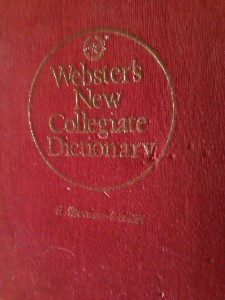Crepuscular, metonym, avuncular, loquacious… It’s so easy for a writer to become infatuated by words. Sometimes it’s the sound of the word. Sometimes it is the specificity of its meaning. Sometimes it’s so cool that you just want to use it in something.
I love crepuscular. In addition to rolling off the tongue, the meaning is precise. Crepuscular describes a creature of twilight. Cats are crepuscular. They hunt during the twilight hours just before the dawn and at dusk. The word twilight has been hijacked by the series of vampire novels. I can’t wait until they fade and twilight goes back to being a wonderful, magical time of the day and a beautiful word.
Metonyms are useful words and phrases. ‘Plastic’ filling in for credit/debit cards OR ‘Washington’ as a substitute for saying the U.S. Government are common and useful when writing dialog. But metonym itself doesn’t flow easily from the mouths of characters. It’s still cool.
Avuncular is old fashioned. It’s the kindhearted uncle of friendly descriptions and it fits into Agatha Christie’s St. Mary’s Mead (home of Miss Marple). It rings false in a noir tale or in contemporary dialog.
I have the same problem with loquacious. Someone recently used it to describe a Tango dancer seeking a partner for a workshop with a famous dance duo. The teacher trying to find him a dance partner sent me a Facebook chat about him. She didn’t know that I already knew him. I found her word choice more than a little ludicrous. Not because she was wrong. He talks, talks, talks…. But I would have led off with a relevant description of him as a dancer. Still, loquacious is a lovely word and her decision to use it instead of ‘talkative’ says a great deal about her as a character.
That’s where my infatuation with words meets my determination to choose the right words for my characters in fiction. If I put loquacious into the mouth of a character, she’d have to be a serious reader with a large vocabulary. Perhaps loquacious would be used by a Scrabble and crossword fan?
Words, words, words…. I love words!






-grin- Now that’s interesting. Did the tango dancer say ‘He’s loquacious, but a good dancer’ or ‘he’s a good dancer, but loquacious’? Very subtle difference of emphasis that can imply all sorts of things about him and her.
Word choice says a lot about writers too. I remember reading the second volume of Stephen Donaldson’s ‘Thomas Covenant, The Unbeliever’ and being amused by the quantity of unnecessarily obtuse words with which he peppered the prose. Even just thinking about it affects the way I write about it! I think he was trying to make some kind of a point, to someone. Luckily it didn’t not stop me from loving the story, but like you, I love weird and wonderful words.
I love your distinction between “he’s a good dancer but…” or “He loquacious but…” She didn’t mention the quality, or lack of it, in his dancing so the choice to describe him as talkative (with a lovely adjective) is particular to the speaker, more than descriptive of the dancer. Now that I think about it, she must have suspected that I knew him. That would account for her unwillingness to tell an outright lie and describe his ability to dance in glowing terms. LOL!
Still, I go back to the word choices of characters. The vocabulary is linked to the speaker. And, to a certain extent, with whom they are speaking. Let’s face it, we select words for our family, for our bosses, for our clients, for our best friends, for business connections, etc. all with different criteria in mind. Once in a while the WRONG word slips out and it is always as if it’s underlined in red. Um… Lots to think about.